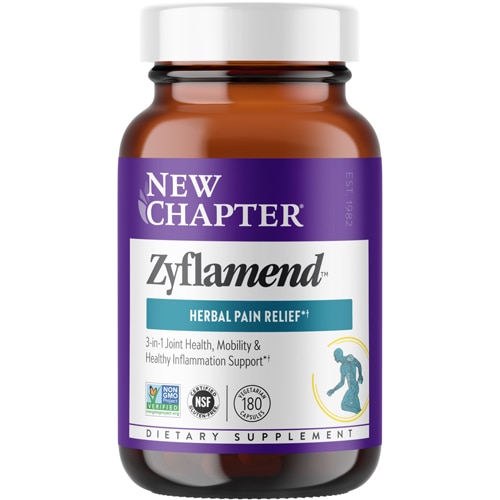Inflammation is a normal and healthy part of your body's immune response. You bang your knee; it gets red and swollen and warm to the touch, but a few days later, it's better. This is called
acute inflammation. It pops up when needed, and then it goes away.

However, with
chronic inflammation, something continues to irritate your body without giving it a fighting chance to heal and restore. Chronic inflammation contributes to conditions such as obesity, diabetes, arthritis, heart disease, Alzheimer’s disease and cancer.
Food can be a significant contributor to chronic inflammation. If you’re eating meals that cause
inflammation three times a day (plus a snack – or two or three – in between), the effects are continuous and long-term, or chronic. Food choices create a vicious attack that the body never gets a rest from.
How do you know if you have chronic inflammation?
Chronic inflammation can manifest itself in a number of ways, with varying intensities:
- Muscle or joint pain: body stiffness
- Weight management challenges: overweight, belly fat, difficulty losing weight
- Allergies
- Skin conditions: red, itchy skin; rashes, eczema, psoriasis
- Low energy: fatigue
- Chronic conditions: arthritis, diabetes, heart disease
- Gastrointestinal issues: gas, bloating, diarrhea, constipation, stomach pain
- High blood glucose levels
If you regularly experience more than a few of these symptoms, talk to your doctor. In addition, you can take matters into your own hands by living a healthier lifestyle and
improving your eating habits.
Inflammatory foods
In many peoples’ go go go lives, convenience is a priority. Yet most packaged, processed and fast foods are inflammatory, as are some other less obvious “natural” culprits. What types of foods should you limit to keep inflammation in check?
1. Sugar
Sugar has been compared to cocaine and heroin with regard to its addictive quality. The more sugar you eat, you more you’ll crave it. Desserts are an obvious source of sugar. However,
sugars also hide in unlikely products like prepared and packaged foods, and combined with desserts, most people are overdoing it. Look for sugar, corn syrup, fructose, and sucrose on food labels. Decrease quantities of soda, cookies, cakes, sugary cereals, candy and processed packaged foods. Also limit synthetic sweeteners like aspartame, which are just as bad.
In addition, refined carbohydrates are processed grains that break down into sugars when eaten. Limit cereals, breads, pizza, and other white flour products. Eat more complex carbohydrates like more fruits, vegetables, beans and gluten-free whole grains.
2. Trans-fats and saturated fats
Trans-fats are unhealthy altogether, while saturated fats are OK in limited amounts. Trans-fats are found in vegetable oils labeled as ”hydrogenated” or “partially hydrogenated"; examples are safflower, sunflower, canola, corn, peanut, sesame, soy and palm oil. Saturated fats are contained in meats, full-fat dairy, ice cream and butter.
Avoid fried foods and keep your consumption of mayonnaise, potato chips, packaged snack foods, and margarine at low levels. Coconut oil and
virgin olive oil are healthier choices. Steam vegetables instead of sautéing them in butter.
3. Gluten
Glutenous grains cause acidic conditions in the body, which in turn causes inflammation, particularly in our digestive tract. Reduce the amount of wheat-based cereals, breads and baked goods in your diet. Barley and rye should also be consumed only in lower quantities. Instead, try
quinoa,
teff,
sorghum or
GF-oatmeal. Bake with
almond, coconut, or other GF flour. It’s not as hard as you think and many people feel more energetic and clear when they cut gluten from their diet.
4. Alcohol
Alcohol is high in sugars and causes stress on your liver as you metabolize it. Drink beer, wine, and spirits less often. When you do drink, limit it to just one drink for women or two drinks for men. Or better still, drink water or a
fruit-enriched mocktail instead.
5. Dairy
Dairy cows are infamous for being treated with hormones and antibiotics. Dairy-containing foods include cow’s milk, butter, cheese, ice cream and yogurt. There are many non-dairy milks, like
coconut milk,
hemp milk or almond milk. Non-dairy substitutes now exist for most other dairy products as well. Check labels and choose those with the lowest sugar content.
6. Grain-fed animal protein
Eating mass-produced meat and poultry that have been grain-fed is inflammatory. Animals are kept in unsanitary, cramped conditions and are treated with hormones and antibiotics. Decrease frequency and portion size of (grain-fed) red meat and poultry.
Look for free-range organic meat, eat more wild-caught fish and experiment with plant-based proteins like peas,
lentils and
legumes.
In summary, acute inflammation is a
normal body function; chronic inflammation is not. The more we eat processed, packaged and prepared foods, the more our obesity and chronic disease epidemic will get worse.
Maintaining an active lifestyle, reducing and better managing stress and eating the proper blend of lean proteins, healthy fats, gluten-free whole grains, fruits and vegetables will help you combat chronic inflammation. Avoid or limit processed, packaged, and sugar- and fat-laden foods to keep aggravation of your systems at bay. As Jim Rohn said, “Take care of your body. It’s the only place you have to live.”
 However, with chronic inflammation, something continues to irritate your body without giving it a fighting chance to heal and restore. Chronic inflammation contributes to conditions such as obesity, diabetes, arthritis, heart disease, Alzheimer’s disease and cancer.
Food can be a significant contributor to chronic inflammation. If you’re eating meals that cause inflammation three times a day (plus a snack – or two or three – in between), the effects are continuous and long-term, or chronic. Food choices create a vicious attack that the body never gets a rest from.
However, with chronic inflammation, something continues to irritate your body without giving it a fighting chance to heal and restore. Chronic inflammation contributes to conditions such as obesity, diabetes, arthritis, heart disease, Alzheimer’s disease and cancer.
Food can be a significant contributor to chronic inflammation. If you’re eating meals that cause inflammation three times a day (plus a snack – or two or three – in between), the effects are continuous and long-term, or chronic. Food choices create a vicious attack that the body never gets a rest from.




